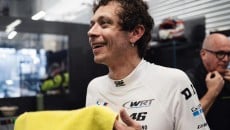Four Grands Prix with the new MotoGP format are now behind us, Portugal, Argentina, Texas and Spain and we know enough to be able to make initial judgments on weekends which have become extremely tight, complex and in some cases chaotic.
Most of the riders agree on the limited time available to prepare the bike, since already on Friday afternoon they have to face a real qualifying session to enter Q2 directly without going through the trap of Q1.
The obstacle of qualifying: now pole counts for two!
Starting from the front or second row in recent years has always been important, but now that qualifying creates the starting grid for two races, the Sprint, and the Grand Prix, it is vital because two races are held and even if the short one only gives half the points starting behind means having the almost mathematical certainty of finishing outside the top nine. Moreover, in terms of scores, only the first positions allow for a good haul.
Sprint Race: one more start not without its risks
Once qualifying is behind you, you need to prepare immediately for Saturday's Sprint race, and it's not just a matter of putting on a pair of soft tires and pushing at 110% with little fuel in the tank and without worrying about tire wear. There are riders who struggle to 'get up to temperature' and bikes that are less suited to 'everything at once', but that's not the main problem. The problem is the start, because two starts on the same weekend means double the risks. And when it was decided to do a Sprint in every Grand Prix, we didn't consider the fact that not all circuits are suitable for doubling this risk. If the track is wide, it means having more space at the first corner, and if the starting line is far away, there is the possibility that the peloton will break up. But on circuits like Jerez, where the start is a few hundred meters from the first double bend, the risk increases. And we experienced it on both race days!
Overtaking and penalties: a problem to be solved
Incidents, or risky but necessary overtaking, both to get out of trouble immediately and to recover positions lost in qualifying by fast riders, herald situations in which it is objectively difficult to blame the riders. Everyone gives their all without any intention of harming their opponents. We had two examples of this in Jerez with the collisions between Morbidelli and Alex Marquez in the Sprint and Quartararo's contact with Oliveira. Multiple responsibilities of all the riders involved which, however, in the end lead to the penalization of only one. And the one who pays is not always the real culprit. Just as it is true that there is not always a real culprit.
The tires under fire
In the end, no one is really satisfied with the new format, because the number of incidents has increased, and the riders are paying for their uncertainty with the frustration of being sanctioned unjustly. This implies the need to find a culprit, and since the stewards and Freddie Spencer who heads them seem impervious to criticism and they too find themselves having to face intricate and tricky situations in a very short time, there are those - this is the case of Morbidelli – who have found a scapegoat in Michelin tires.
We will talk about this separately, but a different race format, with the same tires available, leads to the creation of unfamiliar problems, which must be tackled jointly to find a solution. It is futile to point the blame: the situation is new for everyone. Carmelo Ezpeleta said the format is not definitive and can be adjusted if necessary. F1 has already done it.
Press conferences and the show
The weekend has changed not only for the teams and riders, who are under more pressure, but also for us. Since Thursday, Dorna has been organizing press conferences in succession, even three one after the other, with different riders. In most cases, except for the first one, they are not necessary, but you still must follow them, because the news, the important sentence, can always come out. However, this means that riders and PRs are super busy and less available for any one-to-one events outside the planned schedule. Put simply: there is less time to create stories. Dorna, through its representatives, has already indicated that it welcomes our comments in this regard. We hope they are heard. Motorcycling needs characters, but you rarely get to the bottom of stories when there's a camera aimed at recording everything.
Moto3 and Moto2: from intermediate classes to neglected categories.
The phenomenon is in an advanced stage: Moto3 and Moto2 are increasingly becoming filler classes. Time on the track has already been taken away from them, warm-ups have been abolished, the flurry of conferences does not include the minor categories. The result - but this has been happening for some time now - Moto3 and Moto2 have disappeared from the mainstream media and this is not good for motorcycle racing, which is a collective sport like athletics.
There are many specialties: you don't go to the sports field just to watch the 100 meters, but the protagonists must be recognised, and this doesn't happen today. In short, a phenomenon like Angel Nieto could not be born today. Also because right from the start the championship was set up as a 'road to MotoGP' and in our opinion this is a mistake, because a serial winner in every category gets people talking and is also a point of reference for young riders.
Angel Nieto occasionally raced in invitational races at the end of the season with the 500, but he did it because he was the idol of small displacement categories. This intrigued and brought the public to circuits in Spain, even when the Iberian Peninsula did not have champions in 500. We must not forget that not all nations can have a champion in the premier class, but if there is a champion in another engine capacity, however, cheering for nationalism is born, which is not a bad word.
That's all for the moment. There are other points to talk about. Take these reflections as thoughts spoken aloud. Each of you can add or take away something from this discussion. It's for a better world championship, because you can take our words as criticism, but, more simply, they are our notes made available to the sport to improve it.
The pile-up in the Sprint race
The incident at the start of the Grand Prix










